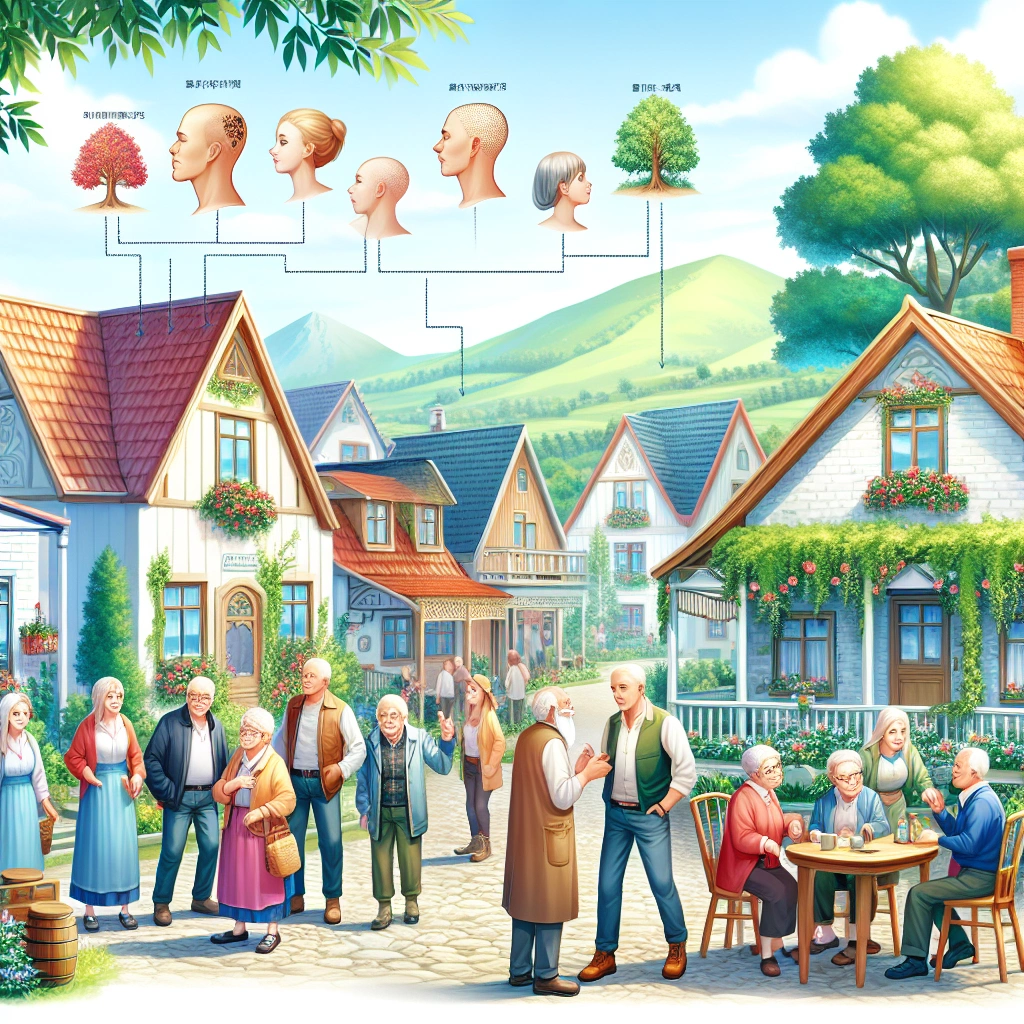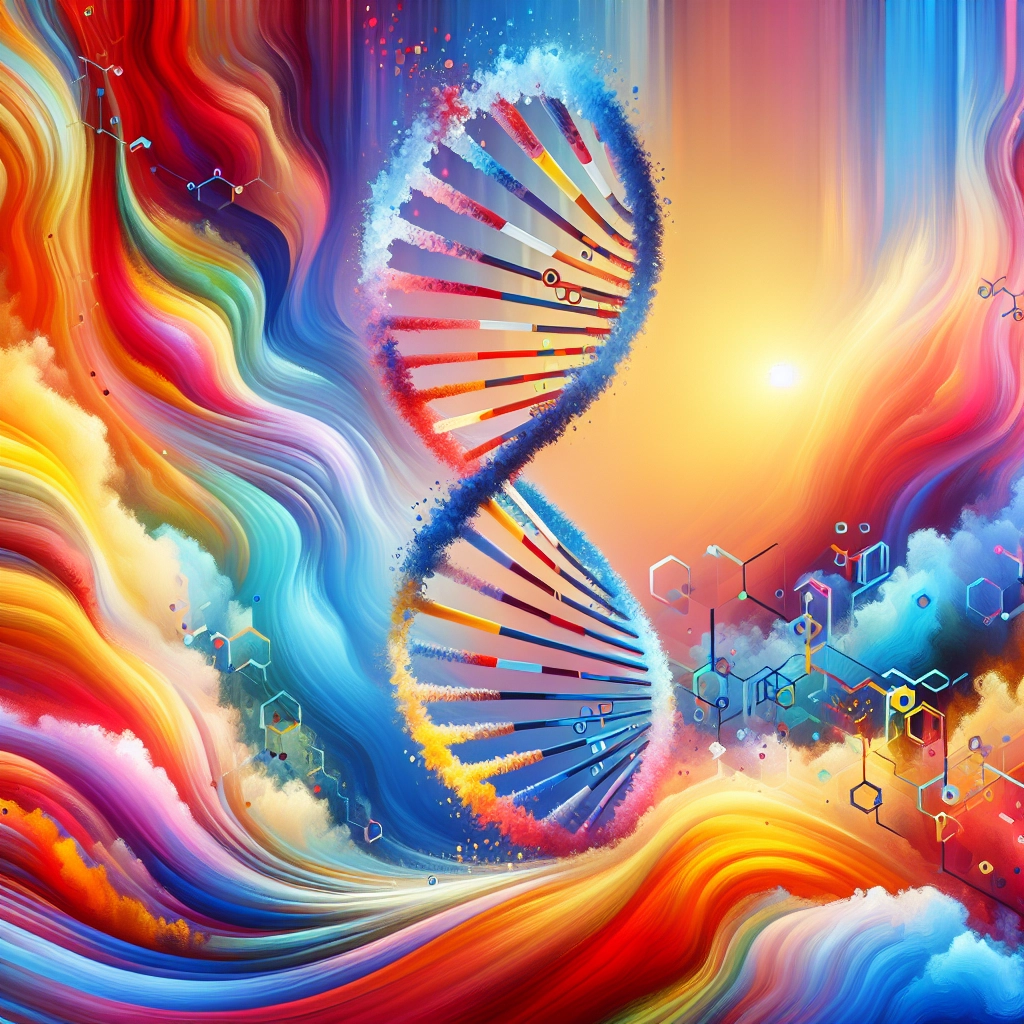Yes, baldness can be hereditary from both mother and father.
Understanding the inheritance of baldness is significant for identifying the risk factors and potential preventive measures.
Baldness can have a significant impact on an individual’s self-esteem and confidence, making it important to comprehend the genetic factors involved in its inheritance.
Check out this Youtube video: “If my paternal grandpa is bald, will I be bald too? – YouTube” for the answer to the question “is baldness hereditary from mother or father.”
Understanding Hereditary Baldness
Baldness can be inherited from both the mother and the father, as it is influenced by multiple genes. While it was previously believed that baldness was solely passed down from the mother’s side, we now understand that genetic hair loss involves contributions from both parents.
Each parent provides genetic factors that can influence the likelihood of experiencing baldness.
Defining Hereditary Baldness
Hereditary baldness refers to hair loss that is passed down through genetic inheritance. This type of hair loss is often linked to the presence of specific genes that increase the predisposition to baldness.
It is important to note that hereditary baldness can be influenced by a combination of genetic factors from both parents, rather than being exclusively derived from the mother or father.
Factors contributing to hereditary baldness
The genetic predisposition to baldness can be influenced by a variety of factors, including the presence of certain genes associated with hair loss. Additionally, hormonal changes and aging can also play a role in the progression of hereditary baldness.
Genetic inheritance patterns in relation to baldness
When considering baldness, it is essential to recognize that genetic inheritance patterns are complex. While specific genes related to baldness may be inherited from either parent, the overall likelihood of experiencing hereditary baldness is influenced by a combination of genetic factors from both the mother and the father.
Genetics of Baldness
The role of genetics in determining baldness is significant, as studies have shown that genetics account for approximately 80% of male pattern baldness. This means that if your father or grandfather experienced baldness, there is a high chance that you may also inherit this trait.
Role of genetics in determining baldness
Genetics play a vital role in determining baldness, with the AR gene on the “X” chromosome being particularly associated with male pattern baldness. Research has shown that individuals carrying this gene have more than twice the risk of developing baldness compared to those without it.
Genes associated with hereditary baldness
Specific genetic variants, especially the AR gene, have been identified as strongly linked to variations in baldness. The androgen receptor gene has been well established as a gene associated with baldness, contributing significantly to the hereditary nature of baldness.
Difference in baldness inheritance between men and women
In terms of baldness inheritance, men inherit the “X” chromosome from their mother and the “Y” chromosome from their father. This means that the genetic predisposition to baldness is largely inherited from the maternal line.
Women, on the other hand, can also inherit baldness genes from both their mother and their father, due to possessing two “X” chromosomes.
Is Male Pattern Baldness More Likely to Be Inherited from the Mother’s Or Father’s Side?
Baldness often seems like an inevitable fate, with many individuals wondering whether they can attribute their receding hairlines and thinning crowns to their mothers or fathers. The reality, however, is a touch more complex than the simple blame game.
Let’s delve into the genetic intricacies of baldness inheritance and unravel the truth behind this common myth.
Investigating the common myth of baldness inheritance
First and foremost, it’s essential to address the common misconception surrounding the direct transmission of baldness from one parent. While it’s enticing to place the blame squarely on a single family member, the reality is far more intricate than a straightforward linear inheritance pattern.
Baldness involves a combination of genetic factors from both maternal and paternal lineages, making it a multifaceted genetic trait.
Exploring genetic research on the inheritance of baldness
Genetic studies have shed light on the complex inheritance patterns associated with baldness. The AR gene, located on the “X” chromosome, has emerged as a key player in the inheritance of male pattern baldness.
Research indicates that individuals carrying this gene face a significantly heightened risk of developing male pattern baldness, emphasizing the pivotal role of genetic factors in baldness inheritance.
Understanding the influence of maternal and paternal genes in baldness
Maternal Genes
Paternal Genes
Contribution of “X” chromosome genes
Inheritance of “Y” chromosome
Potential genetic predisposition for baldness
Impact on genetic expression of baldness traits
Both maternal and paternal genes play vital roles in the inheritance and expression of baldness traits. While the “X” chromosome from the mother carries potential genetic predispositions for baldness, the paternal “Y” chromosome also exerts influence on the genetic expression of baldness traits, contributing to the intricate interplay of genetic factors in determining an individual’s predisposition to male pattern baldness.
The Role of Maternal Genes
Impact of maternal genes on baldness inheritance
The impact of maternal genes on baldness inheritance is significant, as the X chromosome carries the androgen receptor (AR) gene responsible for male pattern baldness. Since men inherit their X chromosome from their mother, the genetic predisposition for baldness is inherited through the maternal lineage.
Scientific studies supporting the role of maternal genes in baldness
Scientific studies have provided substantial evidence supporting the role of maternal genes in male pattern baldness. A large study of 12,806 men of European ancestry found that individuals with the AR gene on the X chromosome had over twice the risk of developing male pattern baldness compared to those without the gene.
Explaining the mechanism of how maternal genes influence baldness
The mechanism of how maternal genes influence baldness lies in the inheritance of the X chromosome. The AR gene, which is a key factor in male pattern baldness, is present on the X chromosome.
As a result, the genetic predisposition for baldness is transmitted through the maternal line, highlighting the significant influence of maternal genes on the inheritance of baldness.
| Maternal Genes | Influence on Baldness Inheritance |
|---|---|
| X Chromosome | Carries Androgen Receptor (AR) Gene |
| Inheritance | Genetic Predisposition from Maternal Lineage |
| Studies | Large Study of 12,806 Men of European Ancestry |
| Risk | Over Twice the Risk with AR Gene |
| Mechanism | Presence of AR Gene on X Chromosome |
All your responses should be written in English (USA).
The Role of Paternal Genes
Influence of paternal genes on baldness inheritance
Paternal genes play a crucial role in determining the inheritance of baldness. The genes inherited from the father, including the androgen receptor gene located on the X chromosome, contribute significantly to male pattern baldness.
Therefore, paternal genes have a direct influence on the likelihood of baldness in offspring.
Research studies highlighting the contribution of paternal genes to baldness
Numerous research studies have highlighted the substantial contribution of paternal genes to the inheritance of baldness. These studies have emphasized the role of the androgen receptor gene, particularly on the X chromosome, in influencing the genetic predisposition to male pattern baldness.
The findings consistently underscore the impact of paternal genes in baldness inheritance.
Understanding the genetic pathways involving paternal genes and baldness
Understanding the genetic pathways involving paternal genes and baldness is essential in comprehending the intricate inheritance patterns of male pattern baldness. Through in-depth genetic studies, it has been revealed that the androgen receptor gene carried by the father’s X chromosome significantly influences the genetic predisposition to baldness.
This understanding sheds light on the intricate interplay between paternal genes and the likelihood of baldness in offspring.
| Gene | Chromosome | Contribution |
|---|---|---|
| AR | X | Significant |
Combining Maternal and Paternal Genes
To understand the hereditary nature of baldness, we must examine the interplay between maternal and paternal genes. The inheritance of baldness involves a complex interaction between genes from both parents, particularly the androgen receptor (AR) gene located on the X chromosome.
This genetic interplay significantly impacts the likelihood of experiencing baldness.
Interaction between maternal and paternal genes in baldness inheritance
The interaction between maternal and paternal genes in the inheritance of baldness is crucial in determining an individual’s predisposition to hair loss. The AR gene, located on the X chromosome, is inherited from both parents and plays a significant role in male pattern baldness.
Impact of the combination of genes from both parents on baldness
The combination of genes from both parents directly impacts the likelihood of experiencing baldness. The X chromosome, inherited from the mother, carries the AR gene, which is central to the genetic predisposition for male pattern baldness.
This dual genetic influence shapes an individual’s hair loss patterns.
Dual genetic influence on the likelihood of experiencing baldness
The dual genetic influence stemming from both maternal and paternal genes significantly contributes to the likelihood of experiencing baldness. While the myth of solely inheriting the baldness gene from the mother’s side persists, baldness inheritance is a multi-faceted genetic phenomenon influenced by genes from both parents.
| Maternal Genes | Paternal Genes |
|---|---|
| X Chromosome | Y Chromosome |
| Androgen Receptor (AR) Gene | Non-AR Genes |
Predicting Baldness Through Family History
Exploring the role of family history in predicting baldness
Family history plays a significant role in predicting baldness, with genetic inheritance influencing the likelihood of experiencing male pattern baldness (MPB). Understanding the genetic factors passed down through the family lineage helps in determining the potential for hair loss.
Importance of understanding baldness patterns in the family lineage
It is crucial to comprehend baldness patterns within the family lineage because it provides valuable insights into the genetic predisposition for male pattern baldness. By examining the family history, individuals can gain clarity on the potential baldness outcomes.
Using family history as a guide for potential baldness outcomes
Leveraging family history as a guide for potential baldness outcomes empowers individuals to proactively address hair loss concerns. By acknowledging the hereditary impact on baldness, individuals can take preventive measures or explore suitable treatments, thereby managing their hair health effectively.
Environmental Factors in Baldness
Hair loss can be influenced by various environmental factors such as exposure to environmental toxins like hair cosmetics, traction, heat, water, solar radiation, and X-irradiation. These environmental and cosmetic factors can contribute to hair loss and damage, exacerbating the expression of baldness genes.
Understanding how lifestyle and external factors can impact the expression of baldness genes is crucial. Apart from genetic predisposition, acquired lifestyle choices can also predispose individuals to hair loss.
Factors such as stress, diet, medication, nutrition, food supplements, and overall lifestyle play a significant role in the manifestation of hair loss.
It is important to consider environmental factors alongside genetic inheritance when examining the influence of environmental factors on baldness. While genetic factors play a crucial role in baldness, it is essential to acknowledge the impact of environmental elements in conjunction with genetic predisposition.
Overcoming the Stigma of Baldness
Addressing the social stigma associated with baldness
Baldness, often associated with loss and aging, has been stigmatized in our society. A full head of hair is seen as a symbol of youth and vitality.
Many individuals experiencing baldness feel stigmatized, leading to feelings of unattractiveness and a lack of confidence. This social stigma can take a toll on one’s emotional well-being, making it crucial to address and challenge these societal perceptions.
Strategies for embracing baldness as a natural genetic trait
It’s important to recognize baldness as a natural genetic trait that can be inherited from either the mother or father. By understanding that baldness is influenced by genetics, individuals can reframe their mindset and embrace it as a unique characteristic of their genetic makeup.
Embracing baldness as a natural trait can help shift the focus from societal judgment to self-acceptance and empowerment.
Promoting self-acceptance and confidence for individuals experiencing baldness
Promoting self-acceptance and confidence among individuals experiencing baldness involves fostering a positive self-image and embracing one’s individuality. By focusing on inner qualities and personal accomplishments rather than external appearances, individuals can build resilience and confidence.
Engaging in open conversations about baldness and challenging societal beauty standards can also contribute to creating a more accepting and inclusive environment for those with balding experiences.
| Strategies for Embracing Baldness |
|---|
| Embrace baldness as a natural genetic trait |
| Reframe mindset and embrace uniqueness |
| Foster self-acceptance and resilience |
| Challenge societal beauty standards |
| Promote open conversations about baldness |
Effective Treatments for Baldness
Baldness is a common concern for many individuals, and luckily, there are various medical and non-medical treatments available to address this issue. Some of the most effective treatments for baldness include:
| Treatment | Description |
|---|---|
| Minoxidil (Rogaine) | This over-the-counter treatment comes in liquid, foam, and shampoo forms, and is known for promoting hair growth. |
| Finasteride (Propecia) | Available through prescription, finasteride blocks the hormone dihydrotestosterone (DHT) to prevent hair loss. |
| Hair Transplant Surgery | This surgical procedure involves relocating hair follicles from a donor site to the balding areas for natural hair growth. |
These treatments have shown efficacy in addressing baldness concerns and have provided relief for individuals experiencing hair loss. It’s important to consult with a healthcare professional to determine the most suitable treatment based on individual circumstances.
Historical Evolution of Baldness Perception
Tracing the historical perception of baldness in different cultures
Baldness has been perceived differently across various cultures throughout history. For instance, in ancient Egypt, balding was embraced with different balding hairstyles, while in early modern England, it symbolized social maturity and non-threatening dominance.
Understanding the evolution of societal attitudes towards baldness
Societal attitudes towards baldness have evolved over time, with the perception of baldness shifting from being perceived as a sign of wisdom and nurturance to a symbol of masculinity in certain historical periods. In some cultures, it was even associated with celibacy, purity, and chastity, reflecting symbolic significance beyond mere physical appearance.
Impact of historical beliefs on the contemporary understanding of baldness
The historical beliefs surrounding baldness have significantly influenced contemporary perspectives. Despite the changing societal attitudes, remnants of historical perceptions of baldness still persist, shaping the modern understanding of baldness and influencing individual experiences and societal norms.
| Culture | Perception |
|---|---|
| Ancient Egypt | Embraced balding |
| Early England | Symbolized maturity |
Statistics on Hereditary Baldness
According to research, the prevalence of vertex or full baldness significantly increases with age, from 31% in the age group of 40-55 to 53% in the age group of 65-69. Additionally, a receding frontal hairline was observed in 25% of men aged 40-55 and 31% aged 65-69 [1]. This indicates a clear correlation between age and the likelihood of experiencing genetic baldness.
Presenting statistical data on the prevalence of hereditary baldness
| Age Group | Percentage of Vertex or Full Baldness | Percentage of Receding Frontal Hairline |
|---|---|---|
| 40-55 | 31% | 25% |
| 65-69 | 53% | 31% |
Analyzing demographic trends related to genetic baldness
In the United States, male pattern baldness affects approximately 80% of men by the age of 80 years. It is essential to recognize this as a widespread issue that has a significant impact on the male population.
Furthermore, the psychosocial effects of baldness further highlight the urgency of understanding its genetic aspects.
Highlighting the significance of understanding baldness inheritance from both parents
While it is commonly believed that the baldness gene is inherited from the mother’s side, it is crucial to note that genes from both sides of the family play a role in the likelihood of experiencing baldness. This presents the need for a comprehensive understanding of the genetic factors contributing to baldness.
The Psychological Impact of Baldness
Baldness, whether hereditary from the mother or father, can have significant psychological effects on individuals. Many people experience anxiety, depression, embarrassment, and reduced confidence due to genetic baldness.
This can lead to social withdrawal and even suicidal tendencies in severe cases. Coping with genetic baldness emotionally can be challenging, and it’s important to address the emotional toll it takes on individuals affected.
Discussing the psychological effects of hereditary baldness
Hereditary baldness can result in a range of psychological effects, including anxiety, embarrassment, and decreased confidence. Individuals may find it challenging to cope with the changes in their appearance, leading to emotional distress and social withdrawal.
The psychological impact of hereditary baldness should not be underestimated, and it’s essential to provide support and understanding for those affected.
Addressing the emotional challenges associated with genetic baldness
Emotionally, individuals affected by hereditary baldness may face significant challenges, including decreased confidence, anxiety, and feelings of embarrassment. Genetic baldness can have a profound impact on self-esteem and mental well-being, requiring understanding and support from both individuals and society as a whole.
Providing support and coping strategies for individuals affected by baldness
Support systems and coping strategies play a crucial role in helping individuals affected by hereditary baldness. Encouraging open discussions, sharing experiences, and seeking support from loved ones and communities can provide emotional relief.
Additionally, adopting healthy living habits, managing stress through activities like daily exercise and meditation, can contribute to better emotional well-being.
| Coping Strategy | Description |
|---|---|
| Healthy Living | Prioritize healthy habits to relieve stress. |
| Support Systems | Reach out to loved ones, friends, or support communities to share emotions regarding hair loss. |
Debunking Myths About Baldness Inheritance
Promoting accurate understanding of genetic baldness inheritance
Is baldness hereditary from mother or father? The inheritance of baldness is more complex than a direct transfer from either the mother or father.
Baldness can be inherited from both sides of the family due to a combination of genetic factors. While it’s commonly believed that baldness is inherited from the maternal side, scientific research indicates that both maternal and paternal genetic contributions can play a role.
Contrary to popular belief, the “baldness gene” is not a single gene but rather a combination of genetic factors. It’s important to debunk the myth that baldness can be attributed solely to one gene.
Instead, a complex interplay of genetic variations from both sides of the family contributes to the likelihood of developing baldness.
While it’s tempting to simplify baldness inheritance, the reality is that multiple genes and their interactions influence whether an individual will experience hair loss. It’s crucial to promote an accurate understanding of genetic baldness inheritance to dispel misconceptions and provide a more comprehensive view of this inherited trait.
Baldness inheritance is not a clear-cut case of solely inheriting the trait from either the mother or father. By debunking the myths surrounding baldness inheritance, we can promote a more nuanced and accurate understanding of the genetic factors at play.
Embracing the complexity of genetic baldness inheritance can lead to more informed discussions and decisions regarding hair loss prevention and treatment.
| Maternal Inheritance | Paternal Inheritance |
|---|---|
| While often assumed to be the primary source of baldness inheritance, scientific evidence suggests that maternal inheritance is just one aspect of the genetic contribution. | Paternal genetic factors also significantly contribute to the likelihood of baldness, debunking the notion that baldness is exclusively passed down from the mother. |
Ethical Considerations in Genetic Baldness Research
Discussing ethical implications of studying genetic baldness inheritance
Studying the genetic inheritance of baldness raises ethical implications related to privacy, consent, and potential psychological impact on individuals. Researchers must ensure that participants provide informed consent and that their privacy is protected throughout the study.
Ensuring responsible and respectful approaches to genetic research on baldness
Responsible genetic research on baldness requires researchers to prioritize participant autonomy, ensuring that individuals have the right to make independent decisions regarding their genetic information. Additionally, respectful approaches involve preventing stigmatization and discrimination based on genetic predispositions to baldness.
Addressing potential ethical dilemmas in genetic baldness studies
Ethical dilemmas in genetic baldness studies may arise when addressing the psychosocial impact of genetic testing results, the potential for genetic discrimination, and the duty to disclose research findings to participants. Researchers must navigate these dilemmas while upholding ethical standards and protecting the well-being of individuals involved.
Conclusion
The complexity of baldness inheritance from both parents highlights the intricate nature of genetic predisposition to hair loss. Various genes from the mother and father contribute to the likelihood of experiencing baldness, making it a multifactorial process influenced by multiple genetic factors.
Moreover, the significance of genetic and environmental factors in baldness cannot be overlooked. While genetic predisposition plays a crucial role in determining the likelihood of baldness, environmental factors such as stress, diet, and lifestyle choices also have a significant impact on the development and progression of hair loss.
Therefore, it is important for individuals and families to have a holistic understanding of baldness, taking into account both genetic and environmental factors. By recognizing the interplay between genetics and lifestyle choices, individuals can make informed decisions to better manage and potentially reduce the risk of experiencing hair loss.















